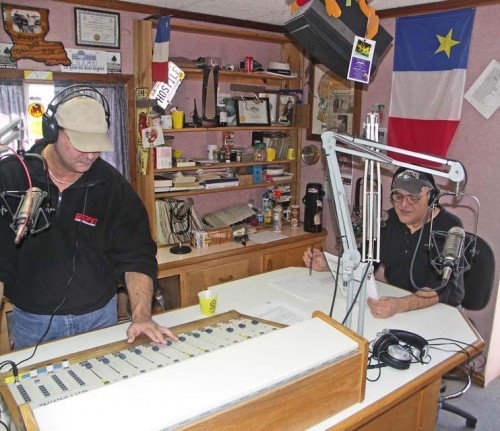
Westside extension right-of-way land acquired
December 14, 2010Thursday, Dec. 16
December 16, 2010There was a time when a cross-country journey offered more than a variety of scenery, cheap motels, a multitude of diners, historic roadside placards and cheesy tourist attractions.
There were the sounds of the road. Traveling coast-to-coast one could always tell what region was being toured by the style of music coming out of the car radio.
The ride would provide a mix from sophisticated and hip sounds in New York, to big band swing in Chicago, Memphis blues, country western in Dallas, or rock ‘n’ roll in Los Angeles. Each region had its distinct cultural sound even among broader musical genres. Local flavor made otherwise similar tunes unique.
That all rapidly changed around the time of what became known as the British invasion during the mid-1960s. Record companies shifted into high gear to capitalize on the financial benefits of mass marketing to an influential generation called baby boomers. Promoters and the artists they played were out to take a larger piece of the pie, while broadcasters obliged.
Many small, independent radio stations were bought-up by corporate chains. And it did not take long before formats were modified to match the money with top hits as syndicated programming become more common than not.
Although the Grand Ole Opry ruled Nashville and Motown laid claim to the upper Midwest, musical expressions and tastes were crossing boundaries and blending to the degree that Top 40 tunes, Billboard listings, Dick Clark and Casey Kasem became standard bearers and well-known purveyors of what was socially acceptable and musically identifiable anywhere a dial could be turned.
Then there was Louisiana. Even with the rich history of jazz and blues out of New Orleans and swamp pop holding its own spot throughout the bayous, times were still changing and new generations were being exposed first to Elvis and then the Beatles, and even more variety after that.
Yet, beneath it all music lovers from Tidewater to Toomey and Colquitt to Cocodrie maintained a custom that was rooted in the Louisiana swamps and even influenced outside artists.
Some loyalists could have easily wondered if their style that already blended classic country, rhythm and blues, and zydeco would one day grow to be homogenized into what was becoming a non-specific contemporary American sound. Others believed there would always be a loyal following of the Cajun sound.
Regional musical flavor might have been threatened for a while, but according to some local traditionalists like Jerry “Truck” Gisclair, there is a new and growing appreciation for the customs of southern Louisiana and the sounds that go with them.
Gisclair, a Lafourche Parish native and baby boomer, has been involved in multiple career ventures over the years, and also serves as a Louisiana state representative n a detail he tends to downplay when talking about his core business.
In 1979, Gisclair started an offshore telecommunications company. But it was an advertisement announcing that his hometown of Larose had been assigned a commercial radio channel that caught his attention in 1984.
That is when he moved into the business that captured most of this time and attention for what has now been more than a quarter century.
“With our electronics experience we took the broadcast station as a big electronics project, not knowing what I was getting into,” Gisclair said.
By 1993, Gisclair, with assistance from Buddy Miller, built a new studio for KLRZ 100.3 FM in Larose. The success of this station led Gisclair to purchase KLEB 1600 AM in Golden Meadow in 1998, and then acquire KANE 1240 AM in Iberia in 2001.
But it’s not the number of radio stations a man has that makes a story. It’s what he does with them.
When he started out, Gisclair’s programming formats moved from Top 40 to rock and back to Top 40 with some country western thrown in along the way. As with many independent, small market communication businesses, Gisclair’s attracted a series of young on-air talent, most of whom viewed their job as a stepping stone in hopes of making it big in New Orleans or other larger markets.
Gisclair and Miller looked to commercial radio experts in an attempt to find a working combination for their regional stations. “Buddy and I took a ride to Ville Platte, to KVPI, where Mr. Jim Soileau is general manager,” Gisclair said. “Anyway, they were more into country western at the time. I was asking Mr. Jim, ‘How much French music and zydeco music do you play?’ He said 24 hours. That’s 24 hours a week. Four hours a day, six days a week.
“I asked him, ‘What do you think of a station playing this music 24 hours a day, seven days a week?’ He said, ‘It will never work,’” Gisclair said.
After that visit and during the latter part of 1998, Gisclair and Miller went full time with their emphasis on traditional Cajun and claim they have no intention of making a change now. “Here we are,” Gisclair said with a shrug.
Miller, who got his start in front of the microphone only after an early morning deejay at KLRZ quit on the spot because he could not handle getting up at 4 a.m., brings a French and English blend of conversation, as well as a distinct accent, to the mix and along with radio and television veteran Joey Delgrandile hosts the Hot Sauce Express on week mornings between 6 and 10 a.m.
When these two are on the clock the “w” word [work] is frowned upon. “We don’t think of this as work,” Delgrandile said. “Here it’s more personal. It’s family.”
Miller and Delgrandile said that being with a locally-owned and regional station helps them keep a focus on their Cajun culture that would not otherwise be possible if they were owned by a large network chain.
Delgrandile, who spent two years in a larger Connecticut market, returned to Lafourche Parish because, like his on-the-job partners, he wanted to be part of the local community and not subjected to corporate decision makers 1,300 miles away.
“When I first started [with a corporate station he declined to name], I was just a number. Not here,” Delgrandile said as he noted the advantage of now living five minutes away from where he gets paid to spend his day in Larose.
“I think [KLRZ and KLEB] have done an outstanding job for the community,” Miller said. He noted promotions and opportunities they have had by being able to adjust programming and focus on the interests of a local market.
“A lot of the time, these guys will say something in French and then repeat it in English,” Gisclair said regarding how his on-air personalities throughout the day communicate with their range of listeners.
“If something comes up and we have to stop in the middle of some song and say, ‘Look, people you need to do this or that for the community,’ we can,” Miller said. “You don’t know this, but that warehouse back there was the main distributing hub during [Hurricane] Katrina. We were part of that. If people needed to know where to get help, we can tell them. Jerry is culturally oriented and so is [Joey]. So am I. I’m dug into Golden Meadow like an Alabama tic.”
Gisclair, Miller and Delgrandile said that their overall format, which includes not only traditional Cajun music, but also a mix of complimentary regional country, jazz and blues, as well as local sports and call-in talk programming, works to keep the culture alive. “We’re trying to do all Louisiana artists 99 percent of the time,” Gisclair said.
Delgrandile said their effort is not just a matter of capitalizing on music a segment of the population enjoys, but one of keeping a language and tradition alive. A tradition that he and Miller explained has influenced larger blocks of popular music.
One example, noted by Delgrandile, is that of Abbeville native Robert Charles Guidry, professionally known as Bobby Charles, who wrote and recorded a song originally titled “Later Alligator” in 1955 only to have Bill Haley and the Comets make it famous one year later as “See You Later Alligator.” He also wrote “Walking to New Orleans,” which was recorded by Fats Domino in 1960.
It is “swamp pop,” a musical style that emerged out of southern Louisiana and had it’s momentary fame during the late 1950s and early 1960s, from both older and younger artists, that has a certain appeal for listeners of this station. It is also coverage of local high school sports, the participation in area festivals and short spots during which listeners are offered lesson in French that make what Gisclair has named his three-station Coastal Broadcasting Network stand apart from the competition.
“Let’s be realistic,” Miller said. “The Tri-parish area is mostly Cajun people. We love the French music and the swamp pop. It’s our local radio station.”
Louis Picou of Houma said that she and her husband, Michael, as well as their children, appreciate having media outlets that respect the background of the people in this region. “Yeah, we listen to it a lot,” she said of KLRZ. “We don’t have a stereo in the house, but we listen when we are going in the car.”
Songwriter Waylon Thibodeaux, of Houma, said that he also appreciates having a radio station that will play his music even though he might not be a world famous artist. “I think the station has done a tremendous job for the people of south Louisiana. The staff works so hard at keeping things running, which is not an easy task with all the competition from the Internet and television,” he said.
Gisclair said he is glad that his broadcast ventures have become an important element to the communities and region they cover, and admitted that putting a focus on Cajun culture and the bayou has been good for business.
“We say we’re ‘the number one tourist destination in Louisiana, the Rajun’ Cajun,’” Gisclair said. Whether listening on the road, at home or over the Internet, the time spent may be worth the journey.
Buddy Miller (left) and Joey Delgrandile present the Hot Sauce Express every morning on KLRZ 100.3 FM and KANE 1240 AM. Remaining true to their Cajun roots has proven a benefit to listeners and the local radio stations that make life on the bayou their business. MIKE NIXON TRI-PARISH TIMES










